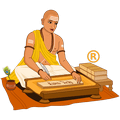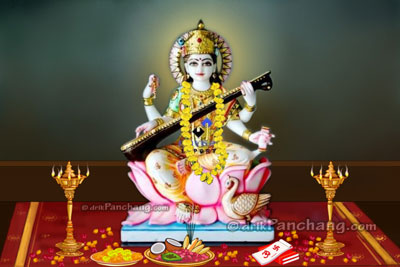












Notes: All timings are represented in 12-hour notation in local time of Columbus, United States with DST adjustment (if applicable).
Hours which are past midnight are suffixed with next day date. In Panchang day starts and ends with sunrise.
Deepavali Puja is also known as Sharda Puja and Chopda Puja in Gujarat. Sharda Puja is dedicated to Goddess Saraswati. Sharda is one of the names of Goddess Saraswati, the Hindu goddess of knowledge, wisdom and learning.
Goddess Lakshmi, the goddess of wealth and prosperity, is the prime deity who is worshipped during Diwali Puja. However, Goddess Sharda and Lord Ganesha are given equal importance during Diwali Puja. Traditionally, all three deities are worshipped during Diwali Puja. Most wall posters, calendars and clay statues available in the market for Diwali Puja put the trio together.
In Hinduism, it is strongly believed that wealth without wisdom and knowledge is not sustainable. People can become prosperous and wealthy with the gratitude and blessing of Goddess Lakshmi. However, if Lord Ganesha and Goddess Sharda, who bestows wisdom and knowledge respectively, are not pleased then wealth and prosperity cannot be sustained and grown. Hence to sustain wealth and prosperity one needs wisdom and to grow the wealth one needs knowledge. Hence, most Hindu families worship Goddess Saraswati and God Ganesha, along with Goddess Lakshmi during Diwali Puja.
The day of Sharda Puja is significant for students to seek blessings of Goddess Sharda. Hence students offer special prayers for success in their studies.
Apart from students, the day of Sharda Puja is also significant for business families who maintain their account books. In Gujarat traditional account books are known as Chopda. New Chopda(s) are inaugurated during Sharda Puja in presence of Maa Sharda as well as Goddess Lakshmi and Lord Ganesha. It is strongly believed that any business needs blessing of all three deities to grow and to become successful and profitable.
Hence, Sharda Puja is an integral part of Diwali Puja and often used interchangeably with Chopda Pujan and Diwali Pujan especially in Gujarat.